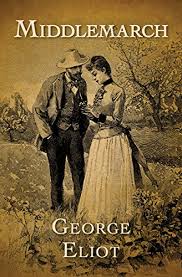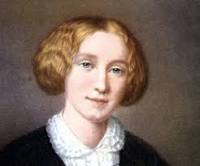Middlemarch Page #34
Middlemarch, A Study of Provincial Life is a novel by the English author George Eliot, appearing in eight instalments in 1871 and 1872. Set in a fictitious Midlands town from 1829 to 1832, it follows distinct, intersecting stories with many characters.
“What a brown patch I am by the side of you, Rosy! You are the most unbecoming companion.” “Oh no! No one thinks of your appearance, you are so sensible and useful, Mary. Beauty is of very little consequence in reality,” said Rosamond, turning her head towards Mary, but with eyes swerving towards the new view of her neck in the glass. “You mean my beauty,” said Mary, rather sardonically. Rosamond thought, “Poor Mary, she takes the kindest things ill.” Aloud she said, “What have you been doing lately?” “I? Oh, minding the house—pouring out syrup—pretending to be amiable and contented—learning to have a bad opinion of everybody.” “It is a wretched life for you.” “No,” said Mary, curtly, with a little toss of her head. “I think my life is pleasanter than your Miss Morgan’s.” “Yes; but Miss Morgan is so uninteresting, and not young.” “She is interesting to herself, I suppose; and I am not at all sure that everything gets easier as one gets older.” “No,” said Rosamond, reflectively; “one wonders what such people do, without any prospect. To be sure, there is religion as a support. But,” she added, dimpling, “it is very different with you, Mary. You may have an offer.” “Has any one told you he means to make me one?” “Of course not. I mean, there is a gentleman who may fall in love with you, seeing you almost every day.” A certain change in Mary’s face was chiefly determined by the resolve not to show any change. “Does that always make people fall in love?” she answered, carelessly; “it seems to me quite as often a reason for detesting each other.” “Not when they are interesting and agreeable. I hear that Mr. Lydgate is both.” “Oh, Mr. Lydgate!” said Mary, with an unmistakable lapse into indifference. “You want to know something about him,” she added, not choosing to indulge Rosamond’s indirectness. “Merely, how you like him.” “There is no question of liking at present. My liking always wants some little kindness to kindle it. I am not magnanimous enough to like people who speak to me without seeming to see me.” “Is he so haughty?” said Rosamond, with heightened satisfaction. “You know that he is of good family?” “No; he did not give that as a reason.” “Mary! you are the oddest girl. But what sort of looking man is he? Describe him to me.” “How can one describe a man? I can give you an inventory: heavy eyebrows, dark eyes, a straight nose, thick dark hair, large solid white hands—and—let me see—oh, an exquisite cambric pocket-handkerchief. But you will see him. You know this is about the time of his visits.” Rosamond blushed a little, but said, meditatively, “I rather like a haughty manner. I cannot endure a rattling young man.” “I did not tell you that Mr. Lydgate was haughty; but il y en a pour tous les goûts, as little Mamselle used to say, and if any girl can choose the particular sort of conceit she would like, I should think it is you, Rosy.” “Haughtiness is not conceit; I call Fred conceited.” “I wish no one said any worse of him. He should be more careful. Mrs. Waule has been telling uncle that Fred is very unsteady.” Mary spoke from a girlish impulse which got the better of her judgment. There was a vague uneasiness associated with the word “unsteady” which she hoped Rosamond might say something to dissipate. But she purposely abstained from mentioning Mrs. Waule’s more special insinuation. “Oh, Fred is horrid!” said Rosamond. She would not have allowed herself so unsuitable a word to any one but Mary. “What do you mean by horrid?” “He is so idle, and makes papa so angry, and says he will not take orders.” “I think Fred is quite right.” “How can you say he is quite right, Mary? I thought you had more sense of religion.” “He is not fit to be a clergyman.” “But he ought to be fit.”—“Well, then, he is not what he ought to be. I know some other people who are in the same case.” “But no one approves of them. I should not like to marry a clergyman; but there must be clergymen.” “It does not follow that Fred must be one.” “But when papa has been at the expense of educating him for it! And only suppose, if he should have no fortune left him?” “I can suppose that very well,” said Mary, dryly. “Then I wonder you can defend Fred,” said Rosamond, inclined to push this point. “I don’t defend him,” said Mary, laughing; “I would defend any parish from having him for a clergyman.” “But of course if he were a clergyman, he must be different.” “Yes, he would be a great hypocrite; and he is not that yet.” “It is of no use saying anything to you, Mary. You always take Fred’s part.” “Why should I not take his part?” said Mary, lighting up. “He would take mine. He is the only person who takes the least trouble to oblige me.” “You make me feel very uncomfortable, Mary,” said Rosamond, with her gravest mildness; “I would not tell mamma for the world.” “What would you not tell her?” said Mary, angrily. “Pray do not go into a rage, Mary,” said Rosamond, mildly as ever. “If your mamma is afraid that Fred will make me an offer, tell her that I would not marry him if he asked me. But he is not going to do so, that I am aware. He certainly never has asked me.” “Mary, you are always so violent.” “And you are always so exasperating.” “I? What can you blame me for?” “Oh, blameless people are always the most exasperating. There is the bell—I think we must go down.” “I did not mean to quarrel,” said Rosamond, putting on her hat. “Quarrel? Nonsense; we have not quarrelled. If one is not to get into a rage sometimes, what is the good of being friends?”
Translation
Translate and read this book in other languages:
Select another language:
- - Select -
- 简体中文 (Chinese - Simplified)
- 繁體中文 (Chinese - Traditional)
- Español (Spanish)
- Esperanto (Esperanto)
- 日本語 (Japanese)
- Português (Portuguese)
- Deutsch (German)
- العربية (Arabic)
- Français (French)
- Русский (Russian)
- ಕನ್ನಡ (Kannada)
- 한국어 (Korean)
- עברית (Hebrew)
- Gaeilge (Irish)
- Українська (Ukrainian)
- اردو (Urdu)
- Magyar (Hungarian)
- मानक हिन्दी (Hindi)
- Indonesia (Indonesian)
- Italiano (Italian)
- தமிழ் (Tamil)
- Türkçe (Turkish)
- తెలుగు (Telugu)
- ภาษาไทย (Thai)
- Tiếng Việt (Vietnamese)
- Čeština (Czech)
- Polski (Polish)
- Bahasa Indonesia (Indonesian)
- Românește (Romanian)
- Nederlands (Dutch)
- Ελληνικά (Greek)
- Latinum (Latin)
- Svenska (Swedish)
- Dansk (Danish)
- Suomi (Finnish)
- فارسی (Persian)
- ייִדיש (Yiddish)
- հայերեն (Armenian)
- Norsk (Norwegian)
- English (English)
Citation
Use the citation below to add this book to your bibliography:
Style:MLAChicagoAPA
"Middlemarch Books." Literature.com. STANDS4 LLC, 2024. Web. 26 Nov. 2024. <https://www.literature.com/book/middlemarch_242>.




Discuss this Middlemarch book with the community:
Report Comment
We're doing our best to make sure our content is useful, accurate and safe.
If by any chance you spot an inappropriate comment while navigating through our website please use this form to let us know, and we'll take care of it shortly.
Attachment
You need to be logged in to favorite.
Log In